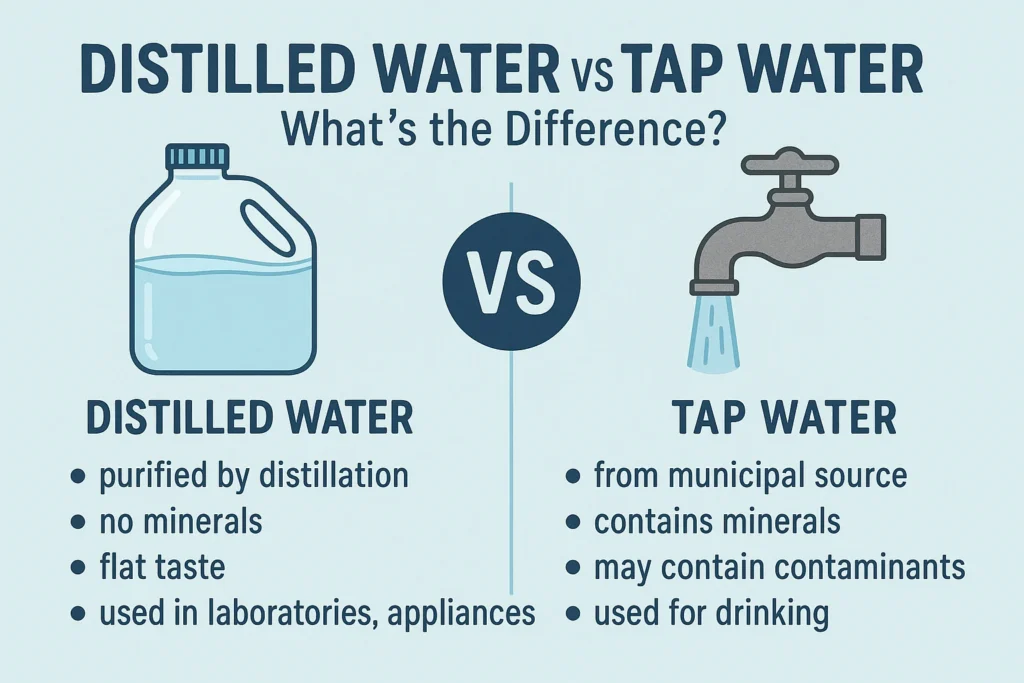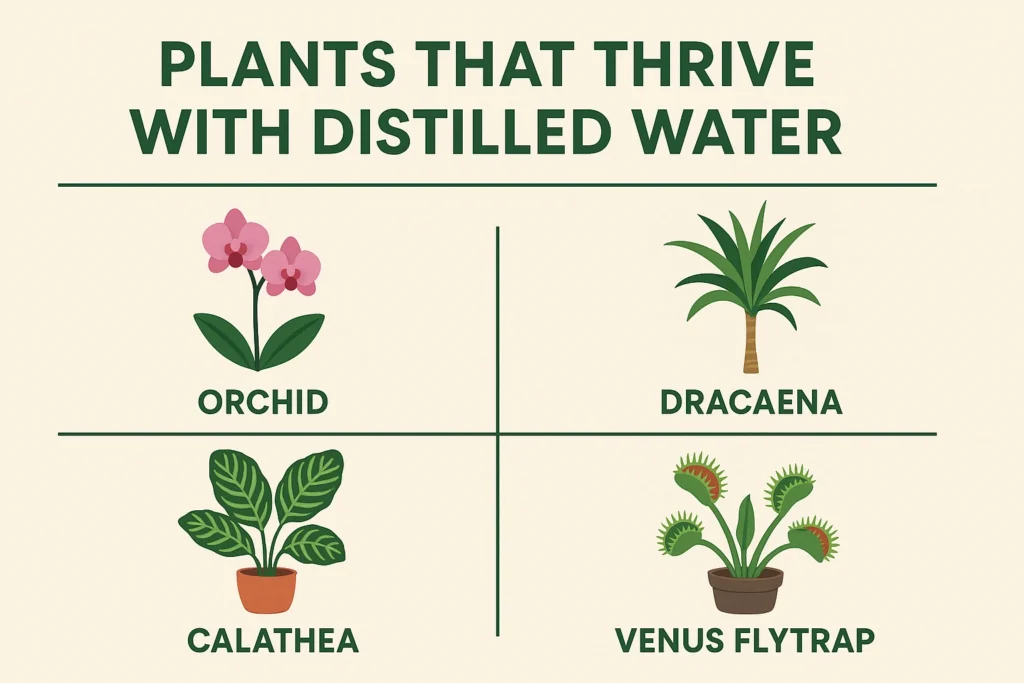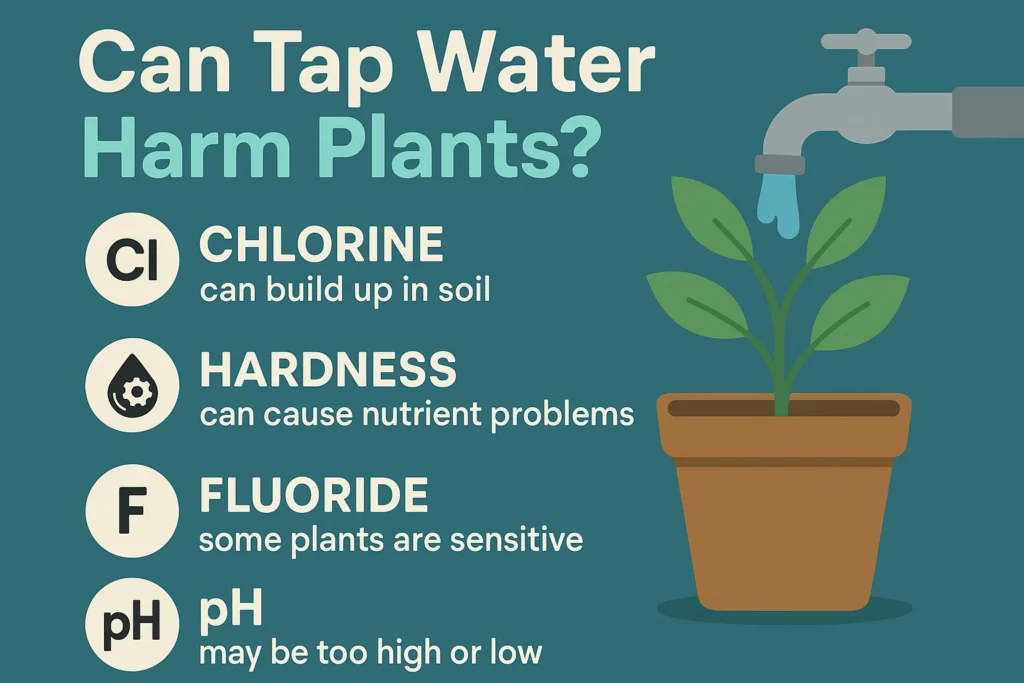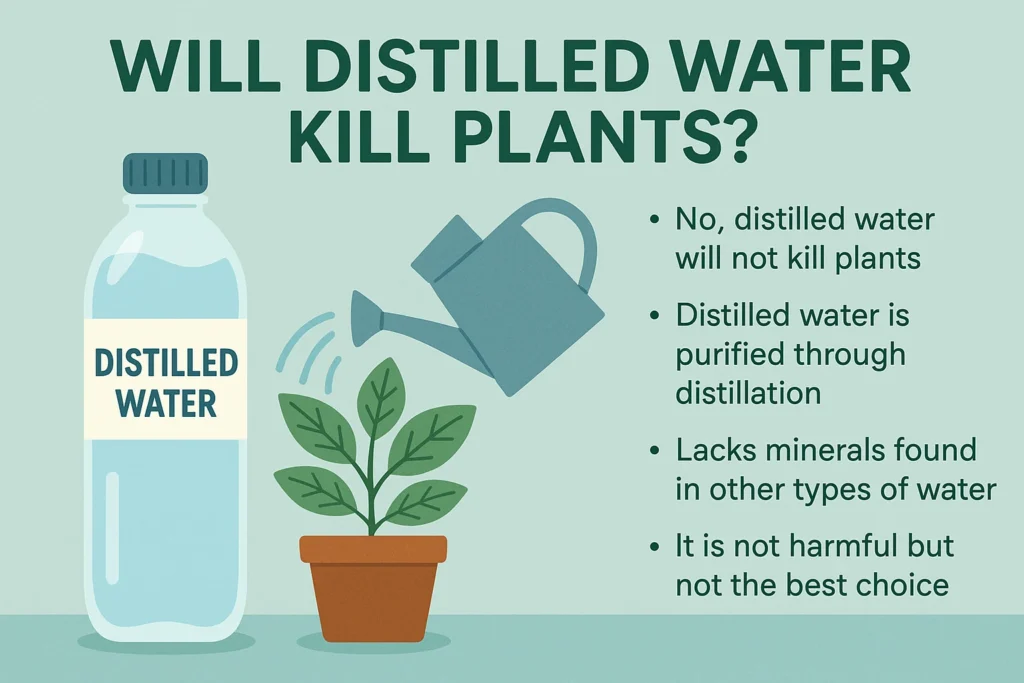Is Distilled Water Good for Plants? What Every Plant Parent Should Know
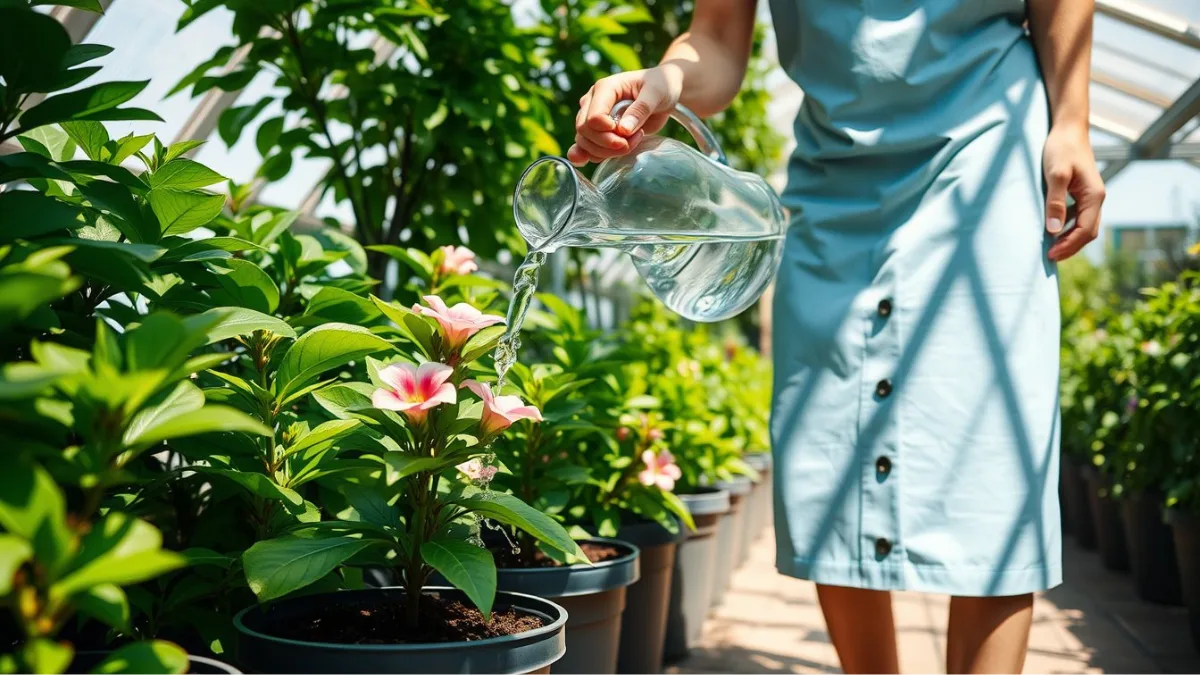
When wondering is distilled water good for plants, the answer comes down to your plant’s specific needs. Ferns, orchids, and spider plants often prefer distilled water because they’re sensitive to additives like fluoride and chlorine. But other plants, especially those used to outdoor rainwater or hard tap sources, may not need it and might even benefit from the trace minerals tap water provides.
Understanding when to use distilled water for houseplants versus when tap or rainwater is sufficient is key. In the following sections, we’ll explore how distilled and tap water compare, which plants truly benefit from distilled water, and whether using it exclusively is ideal—or excessive.
🔗 Wondering about purified water? Here’s our full guide →
Distilled Water vs Tap Water: What’s the Difference?
When comparing distilled water for houseplants to regular tap water, the difference lies in purity—and how plants respond to what’s in their water.
Distilled water is created by boiling water and condensing the steam back into liquid. This process removes nearly all minerals, salts, and chemicals. For houseplants, that means no chlorine, no fluoride, and no risk of salt accumulation in the soil. It’s especially useful in areas with hard water, where mineral content can build up and stress delicate roots.
On the other hand, can you water plants with tap water? Yes, in most cases, you can. Many plants adapt well to it, especially if your municipal water supply is relatively soft. But is tap water OK for plants long-term? That depends. Tap water often contains chlorine and fluoride—both added to make water safe for human consumption, but not necessarily for your plants. Over time, these additives can damage root systems, yellow leaves, and inhibit nutrient absorption.
For example, spider plants often develop crispy brown tips when exposed to fluoride in tap water. That’s why choosing distilled water for houseplants—especially sensitive ones—can make a noticeable difference.
Still wondering is distilled water good for plants? If your plants are showing signs of chemical stress, distilled might be the fix.
🧪 For a deeper dive into water chemistry and houseplant health, check out this expert-backed study.
When Distilled Water is Better?
Some houseplants thrive when you switch to distilled water—and in certain cases, it’s more than just helpful, it’s necessary.
Let’s start with ferns. These tropical plants, like the Boston fern, are known for their feathery, moisture-loving fronds. They’re highly sensitive to salt and chemical buildup in soil. Using tap water regularly can lead to browning tips and stunted growth. Can you give plants distilled water like ferns? Yes, and you should—especially if you notice signs of water-related stress.
Next, orchids. Elegant and exotic, orchids are epiphytes, which means they absorb moisture and nutrients directly through their roots. They don’t tolerate mineral-rich tap water well, especially in containers where buildup happens fast. That’s why distilled water is safe for plants like orchids, allowing them to absorb only what they need without added interference.
Lastly, spider plants (Chlorophytum comosum). Known for their long, arching green-and-white leaves, spider plants are hardy—but extremely sensitive to fluoride. That’s why distilled water for spider plants is often recommended. Even trace amounts of fluoride in tap water can cause visible leaf damage over time.
So, is distilled water good for plants like these? Absolutely. If you’ve noticed browning edges, leaf spots, or mineral crust on the soil, switching to distilled can help restore plant health.
For others, distilled water can still be used as a preventive measure—especially in areas with very hard tap water.
Can Tap Water Harm Plants?
Is tap water bad for plants? Not always—but it can be, especially over time and with the wrong plant species.
Tap water is treated for human health, not plant health. That means it often contains chlorine, chloramine, fluoride, and dissolved minerals like calcium and magnesium. While these additives make water safe to drink, they can disrupt soil pH and lead to nutrient imbalances in sensitive houseplants.
Let’s break it down:
- Chlorine in tap water is common, and while many plants tolerate it in small doses, it can damage root hairs and reduce microbial activity in the soil. Some plants, like peace lilies and calatheas, show stress with yellowing or scorched leaves.
- Fluoride is another concern. This chemical doesn’t evaporate like chlorine and accumulates in the soil over time, affecting plants like spider plants, dracaenas, and prayer plants.
- Hard water—water with high levels of calcium and magnesium—leads to salt buildup around the root zone. This reduces water uptake and causes symptoms like leaf edge burn or white crust on the soil surface.
So while you can water plants with tap water, it’s not ideal in every situation. Regular flushing of soil and occasional use of distilled water for houseplants can help minimize the effects of tap water buildup.
Still asking is distilled water good for plants in comparison? If your local tap water is hard or chemically treated, distilled might be a safer long-term bet—especially for indoor plants.
Will Distilled Water Kill Plants?
No, distilled water will not kill plants. In fact, for many houseplants, it’s one of the gentlest water sources you can use. That said, using only distilled water over time can have drawbacks—especially for plants that benefit from trace minerals found in tap or natural sources.
When people ask, will distilled water kill plants, what they’re really worried about is nutrient deficiency. Distilled water contains no calcium, magnesium, or micronutrients. While that makes it ideal for sensitive species like spider plants and orchids (as mentioned earlier), it also means it doesn’t contribute anything to plant nutrition. If you’re using distilled water exclusively, make sure your fertilizer is well-balanced and includes trace minerals.
Can you give plants distilled water every week? Yes—but pair it with a solid fertilizing routine. And remember: distilled doesn’t replace the nutrients that tap or rainwater might naturally provide. For example, distilled water is safe for plants, but if your pothos or philodendron looks pale despite good light, you might need to adjust your feeding schedule.
So, is distilled water good for plants across the board? Yes—but with proper support. Think of it like filtered air for plants—clean, safe, and neutral—but not a complete substitute for a rich growing environment.
Best Practices for Watering Plants
Choosing the best water for plants depends on the type of plant you’re growing, your water source, and the sensitivity of the species. While distilled water is good for plants, it’s not always the most practical or necessary option. Here’s how the major water types stack up:
Distilled
Pros: Chemical-free, no salts or minerals
Cons: Lacks nutrients, can be expensive
Best For: Orchids, spider plants, ferns
Tap Water
Pros: Convenient, may contain helpful minerals
Cons: Contains chlorine, fluoride, may be hard
Best For: Hardy houseplants like pothos, snake plants
Rainwater
Pros: Naturally soft, contains trace nutrients
Cons: Seasonal, may contain airborne pollutants
Best For: Most houseplants and outdoor container plants
Filtered
Pros: Removes chlorine, reduces heavy metals
Cons: Doesn’t remove all minerals
Best For: General use, especially in hard water areas
If you’re still asking is distilled water good for plants, consider this: it’s excellent for sensitive houseplants or when your tap water is especially hard. But for robust, low-maintenance varieties, filtered or even dechlorinated tap water may work just fine.
💡 Watering Tip: Both water and light affect plant growth. Too little of either can slow root development or cause leggy stems. Use our tools to find your balance:
And if you’re not sure which option is right, start with a flush using distilled water, then return to your regular routine while monitoring leaf health.
🌱 Still wondering: is distilled water good for plants long-term? It is—with the right feeding strategy and good light.
FAQ: Is Distilled Water Good for Plants?
❓ Can I use distilled water every time?
Yes, you can use distilled water for every watering, especially if your local tap water is hard or contains fluoride and chlorine. Just be sure to fertilize regularly since distilled water for houseplants doesn’t contain any trace minerals or nutrients.
❓ Which plants need distilled water?
Plants like spider plants, ferns, calatheas, and orchids benefit the most from distilled water. These are species sensitive to chemicals and salt buildup in soil. If you’re asking, can you give plants distilled water? — for these, the answer is yes, and you should.
❓ Is it ok to water houseplants with tap water?
In many cases, yes. Tap water is ok for plants like pothos, peace lilies, or ZZ plants, especially if your local water isn’t high in chlorine or minerals. However, if you notice browning tips or salt crust on soil, switch to distilled water for houseplants occasionally.
❓ Will distilled water kill plants?
No, distilled water won’t kill plants. It’s safe, clean, and free of harmful additives. But relying only on distilled water without proper fertilization can lead to nutrient deficiencies over time. So if you’re wondering is distilled water good for plants on a regular basis—the answer is yes, with a balanced care routine.

